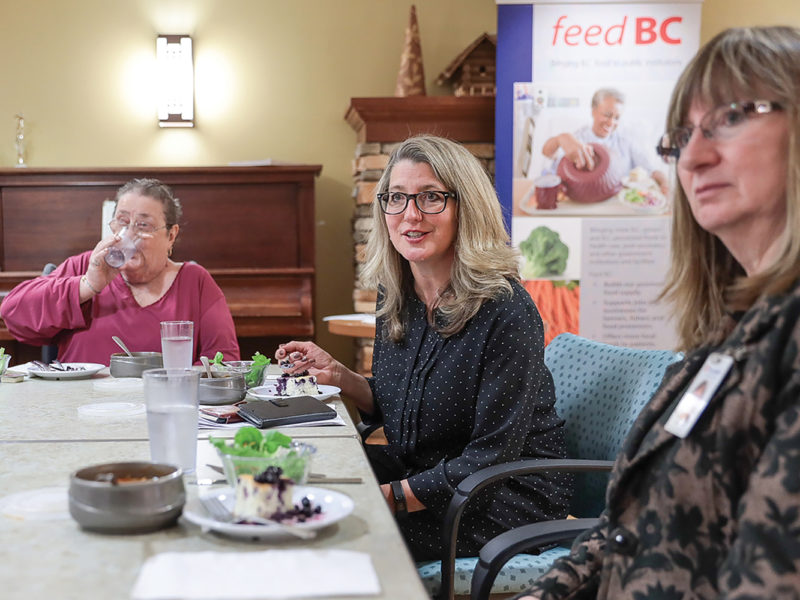VICTORIA – The government’s Feed BC program is gaining momentum as more food hubs come online and post-secondary partners express interest in offering more local products to students.
“We have a dozen food hubs that are underway right now,” says BC Minister of Agriculture, Food and Fisheries Lana Popham. “With the increased budget that we have this year, we’ll be able to do two or three more for this cycle.”
In addition, she says “around 25” public post-secondary institutions have either signed on with FeedBC or are interested in participating in the initiative.
“We have the goal of making sure at least 30% of the food in these institutions is grown or processed in the province,” she said.
However, after tracking consumption data of institutions over the last two and half years, the government is preparing to move the goal post.
University of Northern BC food services director Yazan Kanaan says the university upheld its commitment of 30% local food even during the pandemic. It managed to achieve 35.7% local purchases in the first semester and 40% in the second during the 2020/2021 school year. While UNBC has surpassed the set 30%, Kanaan cautioned that increasing the benchmark may not be the best move until all universities are set up to achieve at least the minimum. Collecting and tracking purchasing and consumption data can be challenging, Kanaan says, especially when universities work with third-party distribution companies such as Sysco.
Feed BC also works with regional health authorities that operate 170 hospitals and residential care facilities.
To properly implement Feed BC, all partners must monitor food purchases to ensure targets are met and commit to sourcing from local producers, Popham notes.
“Our role is to help facilitate conversations between primary producers and those institutions that are trying to make a shift and then everyone in between,” she says.
“This policy brings stability into domestic markets and allows us to … figure out what is needed in institutional buying. The domestic market is the foundation of the house. It takes a while and it is hard to shift a whole food system, but we are seeing a boost in momentum.”
When the Interior Health Authority began purchasing 600,000 BC eggs per year, egg producers noticed the benefit right away, Popham says.
“It shows that a small shift in where you are purchasing from and thinking about BC producers makes an incredible difference in farmers’ bottom lines,” she says.
S&G Farms Ltd. in Oliver currently works with Sysco through the Feed BC program to provide Interior Health with more BC products.
“I think it is really important to buy local products,” says S&G Farms owner Inderjit Sandhu. He and his family grow 50 acres of fresh vegetables for wholesale and retail.
In 2019, the second year of Feed BC, local food purchases by BC health authorities were $3.5 million higher than the year prior “and that is just the beginning,” Popham says.
Island Health patients and the Lower Mainland health authorities joined Feed BC’s healthcare partnership at the end of July.
On the Island, Galey Farms in Saanich and Michell Farms in Saanichton provide fresh produce to Island Health, which also works with local food suppliers including Islands West Produce and B&C Foods.
In the Provincial Health Services Authority, the BC Forensic Psychiatric Hospital in Coquitlam has partnered with Okanagan Select, an Indigenous fishery owned and operated by the Syilx. The group provides sockeye and Chinook for patients. Vancouver Coastal Health and Providence Health Care work with Highline Mushrooms in the Lower Mainland and Monte Cristo Bakery in Delta.
As per the minister’s mandate letter last November, the province also looks to expand the FeedBC program into elementary and secondary schools.
“The Ministry of Agriculture, Food and Fisheries is working towards Feed BC being introduced in the public K-12 school system in the future and we are working closely with the Ministry of Education on the timing,” says the ministry’s public affairs officer Dave Townsend.
BC Minister of Agriculture, Food and Fisheries Lana Popham says the province’s Feed BC program is set to add more food hubs, hospitals and schools to its list of participants. BCMAFF


 Province announces wildfire recovery funds
Province announces wildfire recovery funds